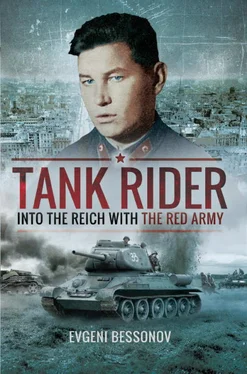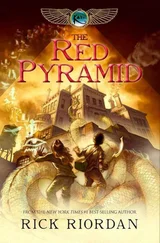Lieutenant Shakulo gave a scolding to the guard for his negligence. We had some sleep until dawn, put our clothes and shoes on and in the morning found the company and battalion commanders. Other companies of the battalion arrived, we had a snack with what God sent us and marched forward on foot. It was quiet, the enemy was nowhere to be seen. Apparently, they had been straggling Germans, remains of destroyed units that ran into us during the night. Anything could happen in that war. For example, when our battalions left the town, all kinds of supply and support units of the battalion and brigade stopped there. They forgot about security, as they knew that the city was liberated from the Germans. German tanks rushed into town in the evening and held a St Bartholomew’s Day massacre – breaking, burning, destroying and squashing everything that was in the streets, as there was no one who could put up resistance. The Germans burnt our battalion’s field kitchen and several cooks were killed. A few eyewitnesses, who made it alive out of Gusyatin, including deputy battalion commander for logistics Zadiran, told us the sad story. On 24 March, 1944, other tank units of our Tank Army arrived at Gusyatin and after some heavy fighting the Germans were once more forced to leave it. So, Gusyatin was liberated twice, and all the merit for the liberation of the town went to the other units, which had liberated the city for the second time, not to our brigade.
I recall a march on foot in the spring of 1944. We would walk in the dirt, barely moving our feet, our greatcoats weighed a ton because of the rain, and I would think: ‘It would be nice to get into a hut, have a hot soup or schi and have a nap for some twenty-five hours’. All kinds of thoughts could be in one’s head during marches, both good and bad ones.
We were happy when tanks from our Brigade’s tank regiment caught up with our battalion and we moved on as tank riders. We had just one objective – to capture Kamenets-Podolsk. Running a bit ahead, I would say that it took the Brigade two or three days to arrive at the town. Both people and tanks were tired; the vehicles couldn’t take such stress either. Tanks stopped more and more often because of small technical breakdowns, especially broken tracks. Of course we tank riders assisted in tank repairs, so as not to fall behind the battalion.
The battalion’s march continued from Gusyatin, the enemy was not putting up serious resistance. Our tanks and the tank-riding infantry crushed separate pockets of resistance. In other cases the Germans did not put up a fight and abandoned villages, sometimes leaving an insignificant delaying force behind. We stopped in a village in order to refuel our tanks and load them with ammo, as well as to make some small repairs. I have already mentioned that the march was very hard and halts were necessary.Villagers gave us food and we lay down for a nap in their houses. As far as I remember, the day was sunny. We were afraid of an air raid, and camouflaged all vehicles well. Indeed, enemy bombers did arrive and bomb the village, but for some reason chose the part which had no tanks or soldiers stationed in it. Evidently, the German pilots did not notice us. After the planes left, we heard women weeping – there were casualties among the civilian population.
At the same halt the following incident took place. A tank driver, apparently after a liberal dose of moonshine, started his tank, but selected reverse gear instead of first gear. The tank broke through the wall of a hut, moving the table to the other wall of the hut while some officers and hosts of the house were having lunch at the table. The driver realized that he was going in the wrong direction and stopped the tank just in time. It was amazing that no one was hurt, but everyone was covered in clay and plaster and the wall of the house was destroyed. Those who were sitting at the table in the hut got off lightly. One of the officers jumped up from the table and with a gun in his hand ran to the driver’s hatch. The driver was scared to death, closed all hatches and sat quietly in the tank, while the others calmed down the officer, who was threatening to shoot the driver. As the result the tank was driven away, and the tank regiment commanders decided to leave the ‘horseless’ tankers (those, who had lost their vehicles) to repair the house.
Later in the day we started to gather for a march and the commanders decided to continue the advance during the night because of the enemy’s air force. In the twilight we started our night-march on tanks. We rushed through villages and towns with lights on the tanks. There were supply vehicles with us, and Studebaker trucks, and this all gave the impression of a huge tank column moving on the road.
At dawn, or rather, early in the morning, we ran into the Germans – infantry and two or three tanks (Tigers and Panthers). A battle commenced. Tanks opened fire from both sides. The 76-mm guns of our Brigade’s artillery battalion also opened fire, some guns were set to fire with open sights. Lieutenant Shakulo and I led our platoons in assault. We both commanded our platoons: ‘Get up, for the Motherland, forward, run!’ We picked ourselves up for the Motherland and ran forward together with everyone. It was good that we did not have to run far – the enemy was less than 100 metres from us.
We rushed into the outskirts of the village, some of the German soldiers were killed, the rest fled. Artillery knocked out one German tank; the second one left the village together with the infantry, while the third one stayed where it was, abandoned by its crew. Its front armour plate had the marks of our shells and its armour was cracked on the side. Apparently it had run out of fuel. Such was the attack.
Every soldier’s action in assault can be considered an heroic deed: it is heroism to attack under machine-gun and artillery and mortar fire from the enemy, not knowing whether you will survive or not. One had to have a lot of stoicism, bravery and courage to overcome all this and drive the Fritzes out of their positions. Kill or be killed – this is the only law of war. It is a scary thing to assault the enemy, you have to overcome your fear, overcome yourself, get up from the ground, get up and make at least the first step to get as close as possible, in short rushes or sneaking on the ground. It is very hard, and then you rush towards the enemy, who concentrates his fire on you. First you run, but sometimes you do not have enough breath to run all the way to the enemy’s trenches, especially across a ploughed field. Then not only can’t you run, but it is hard even to walk, especially in springtime, when your feet sink deep in wet soil. As a rule, though, attacking soldiers will always try to run and at the same time fire at the enemy from submachine-guns, even if they cannot see him. This has a psychological impact on the enemy, so I always ordered my soldiers to fire on the move.
After we had rushed into the village under enemy fire and halted for a short break, I learnt that my friend Lieutenant Petr Shakulo was wounded. Petr was not very lucky: in every operation he would get wounded. Our tanks arrived – they managed to knock out another tank, which was burning in the village, and we moved on with our mission. It was the morning of 24 March, 1944. Besides company commander Titov and I, the company had only one officer left – machine-gun platoon leader, Lieutenant Kolosov.
In the second half of that day, the German air force delivered a strong raid against our battalion and tanks. I rarely saw our fighter planes. The Germans bombed us very often, but the fighters never covered us. The anti-aircraft machine-guns of the brigade were a futile weapon against the German air force; they were simply afraid of opening fire on the Germans, as they feared they would be destroyed. Ground-attack aircraft would support us, bombers would do so more rarely, but I only saw our fighter planes during the Orel operation. A lot has been written and said about there being no fighters in 1941 and 1942, but they were not even there in 1944, when the Germans were strafing at 50 metres altitude, massacring people and tanks. They said that there were no airfields for our fighters. Maybe this was so, but the explanation did not make our life easier. At that time we did not think anything bad about our air force, we were proud of them, we were happy to see them ‘working’ on the enemy. Only at the end of my life did I start to ask questions: why hadn’t our fighters protected us from the enemy’s air force during our marches?
Читать дальше












